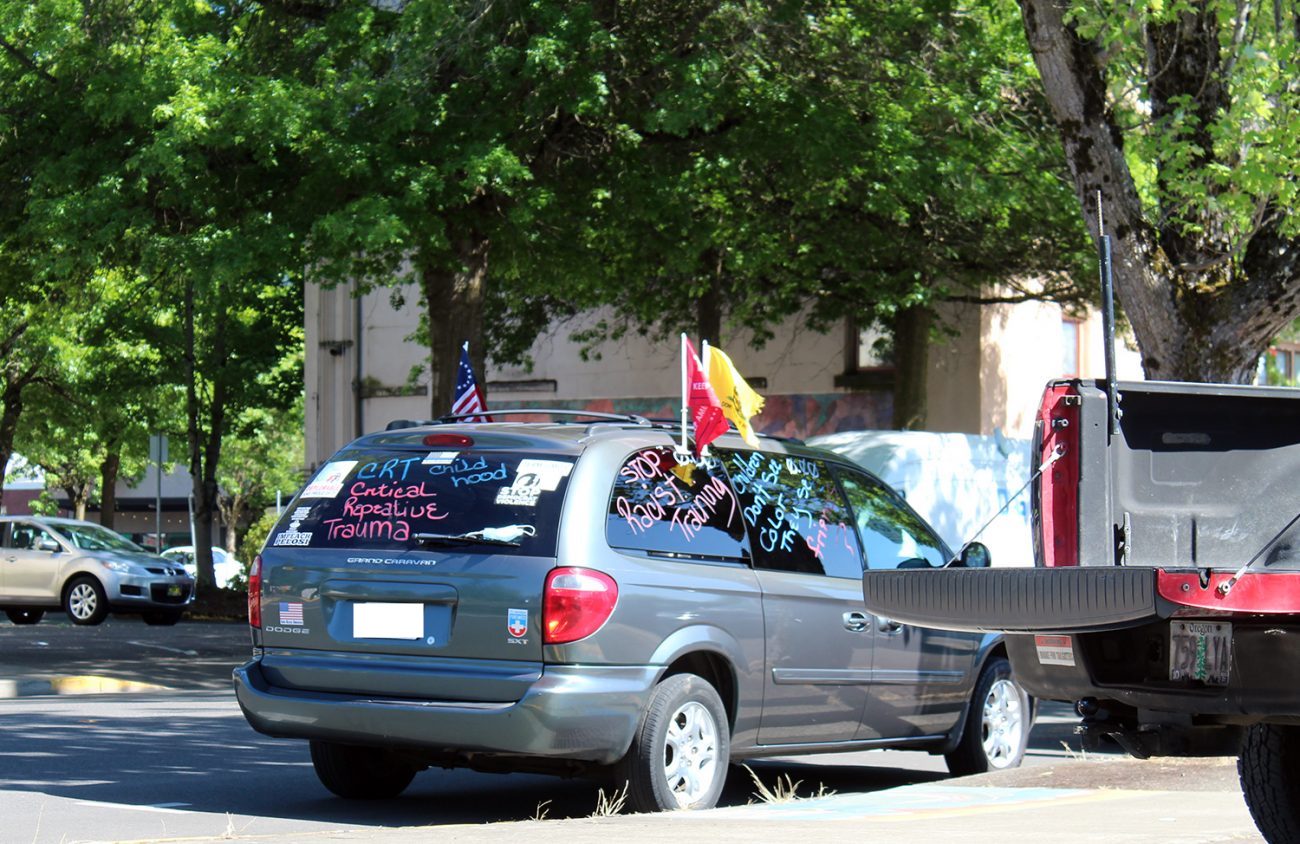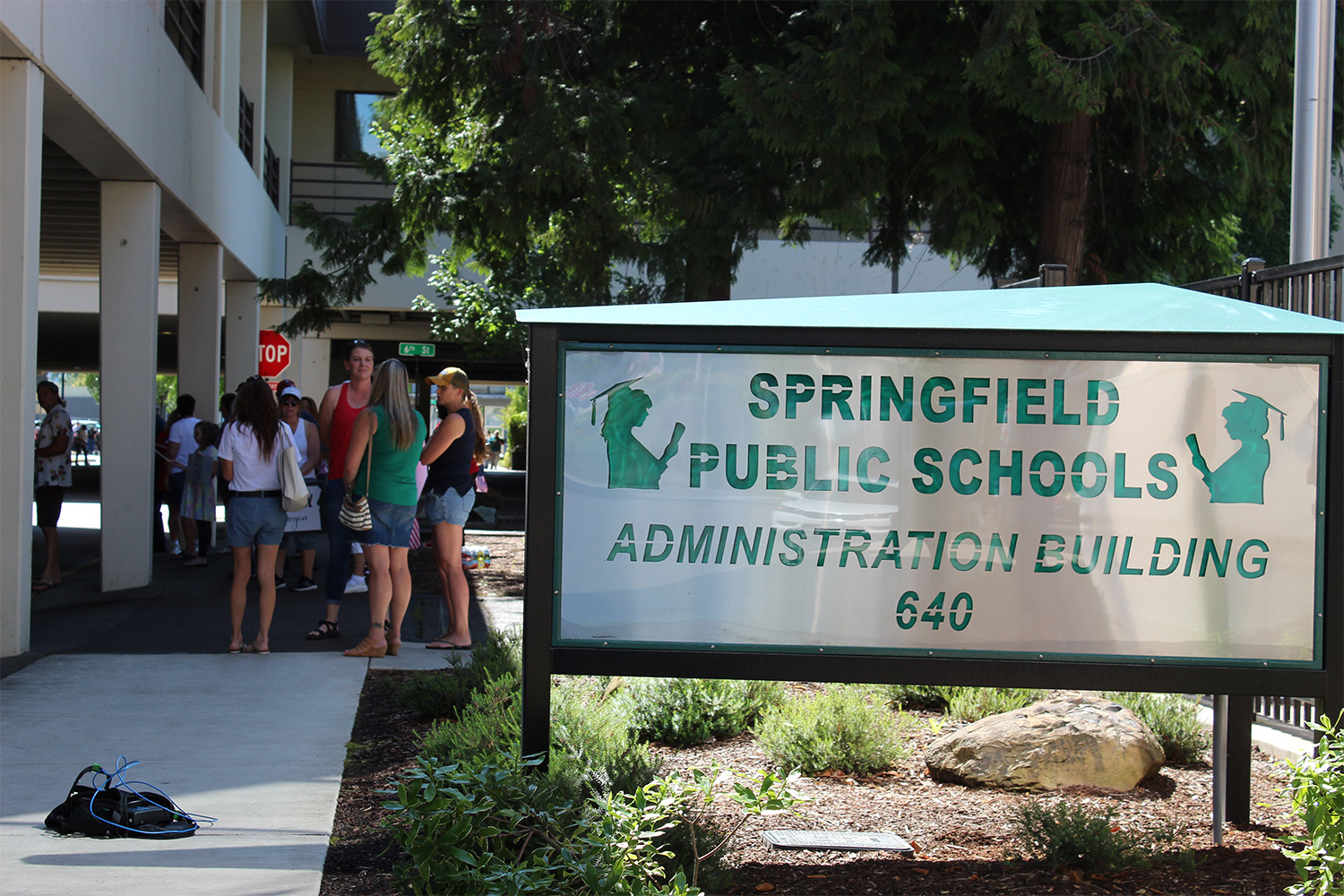More than 20 white community members gathered at the Springfield Public School Administration building late afternoon on June 23. “Made in America” by Toby Keith blasted on a Bluetooth speaker nearby, and protesters sported ‘Make America Great Again’ apparel. A van at the event had “stop racist training” written on its side.
The gathering was in protest of 4th grade Thurston Elementary School teacher Curtis Crosswhite allegedly being put on a two-day academic leave for sharing an email against critical race theory to fellow employees. The district was unable to confirm this happened as of press time.
According to a local teacher, what’s actually taught in Springfield classrooms is different from critical race theory in many ways.
Critical race theory recently resurfaced in March in response to the public outcry over George Floyd’s murder. Many right-wing protesters nationwide are now pushing to ban critical race theory in K-12 education. Critical race theory is an academic concept that says racism in America is systemic in culture and politics. One of the most influential creators of the concept, the late Derrick Albert Bell Jr., was the first Black dean of the University of Oregon School of Law.
Kelly Mason, incoming member of the Springfield Board of Education as of July 1, says that although there has been pushback from parents telling teachers to focus education solely on subjects like math, reading and science, she thinks that public school is also largely about social connections.
“If a Black child is old enough to experience racism, then a white child or student is old enough to learn about it,” Mason says.
Many of the protesters’ concerns about critical race theory, according to Mason, were born out of misinformation on what the idea really means. As an official member of the school board, she plans to push more conversations about public concerns and clarify misinformation.
The email that Crosswhite allegedly shared to staff includes several statements about keeping socialism out of schools and refers to critical race theory being as big of an attack on the U.S. as Pearl Harbor. It references the fictional docudrama film The Social Dilemma as a way to highlight biased media outlets.
Today, educators strive to teach the concept of race in classrooms. However, the material taught in K-12 deviates from the university-level topics that critical race theory typically covers. Devan Fahsholz, a teacher for Eugene International High School at South Eugene High School, says that he does not teach critical race theory. However, he says that he certainly does teach about race and racism.
Fahsholz teaches language arts and social studies. His curriculum is integrated with other teachers in different disciplines, and he focuses on teaching students about literature in different parts of the world.
“Because I teach literature, I’m always making references to social studies in history and themes oftentimes related to race or inequality,” he says. “We don’t have a race curriculum like the ones that have been referenced in the news.”
Fahsholz says that the curriculum has been well-received by students, and that they typically want more of the material. He prioritizes the basic teaching of truth behind race and the idea of privilege. Part of the reason race is important in education, according to Fahsholz, is to empower students for informed decision-making.
“I don’t really have to worry about telling the truth,” he says. “We kind of focus on this idea of not feeling guilty, but taking action to make the world better.”
But on June 14, parents and community members submitted public comments to the Springfield School Board meeting, shaming and criticizing — and misunderstanding — the idea of critical race theory in education. Community members wrote comments claiming that the country is not systemically racist, or that critical race theory seeks to dismantle capitalism.
“Teaching CRT not only divides the children but will cause children to hate themselves which could lead to suicide,” Springfield resident Matthew Carter wrote.
One comment written by Amanda Crosswhite, had exactly the same content as the email that her husband Curtis sent to staff and faculty at Thurston Elementary School.
“Critical race theory is the biggest attack on the United States of America since Pearl Harbor,” Amanda Crosswhite wrote.
Mason says that, as a board member, she plans to create pathways for students with disabilities and students with diverse ethnic or racial backgrounds. She says she hopes to increase accessibility for Spanish speaking families in Springfield. Regarding the conversations around critical race theory, Mason says she supports race-based conversations in the classroom.
“Hopefully we can provide clarity, and in doing so, educate ourselves. As board members, as public servants who serve at the pleasure of our community, it’s our job,” she says. “We were elected to represent this community to be informed and make decisions that would be in the best interest of students.”

